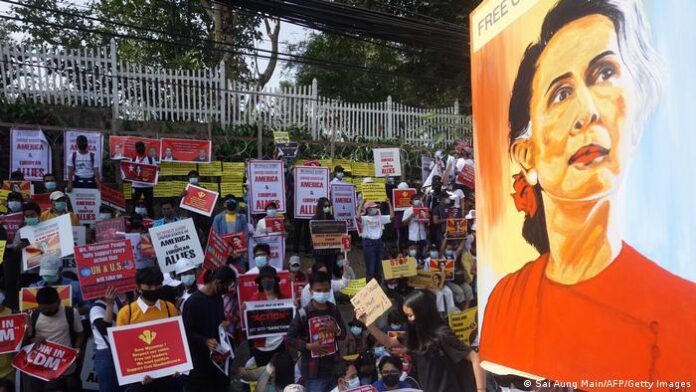Police documents show that Aung San Suu Kyi has been remanded in custody until February 15.
The charges include possession of unlawful communication devices and breaching import and export laws.
It has been reported that Aung San Suu Kyi is being held at her residence in the capital at Nay Pyi Taw while her whereabouts are still unclear.
The documents show that the deposed President Win Myint has also been charged with violating rules banning gatherings during the COVID pandemic. For two weeks, he has also been remanded in custody.
The military seized power in the early hours of February 1 and since then, neither the President nor Ms. Suu Kyi have been heard from.
The installation of an 11-member junta is seen by the coup which is ruling under a year-long state of emergency. The coup is led by armed forces chief Min Aung Hlaing.
The justification of its action is sought by the military by alleging fraud in last November’s elections, which was won decisively by Ms. Suu Kyi’s National League for Democracy (NLD).
WHAT ARE THE CHARGES’ DETAILS?
A police document called the First Initial Report was submitted to a court where the accusations are contained.
The First Initial Report alleges that Ms. Aung San Suu Kyi illegally used communications equipment and imported that was found at her home in Nay Pyi Taw.
The document says that she was remanded in custody to request evidence, question witnesses, and seek legal counsel after questioning the defendant.
Under the National Disaster Management Law, Mr. Win Myint is accused of meeting supporters in a 220- vehicle motorcade during the election campaign in a breach of COVID restrictions.
Those charges seem comically trivial given the gravity of the military’s power grab while claiming that the national unity of Myanmar was at stake and the storm of international condemnation that has followed.
As members of parliament cannot have criminal convictions but they may be enough to secure the objective of the military of barring Aung San Suu Kyi from political office.
To neutralize the threat posed by the enduring popularity of Aung San Suu Kyi since for 32 years, the generals have tried and failed. In every election that she has been allowed to contest, she has won by a wide margin.
Only one election that she did not win was the one that was held by the military government 10 years ago. At that time, she was also barred from contesting by a bizarre criminal conviction which was imposed in her after an American man managed to swim across a lake in Yangon to her home. She was being held there under house arrest.
WHO ALL ARE OPPOSING TO THE COUP?
Civil disobedience is being called for by activists in Myanmar.
As a symbol of defiance, many hospital medics are either stopping work or continuing wearing symbols of defiance in simmering anger over the suppression of the short-lived democracy of Myanmar.
According to the protesting medical staff, they are pushing for the release of Aung San Suu Kyi.
They are wearing black or red ribbons and have been pictured giving the three-fingered salute familiar from the Hunger Games movies and it was used by demonstrators last year in Thailand.
Yangon Youth Network founder Thinzar Shunlei said that the young people in Myanmar have digital power. They have digital devices and they have digital space so that is the only platform for them.
They have been using it since day one since they first few hours that they were opposing the military junta.
To coordinate the disobedience campaign, a Facebook group has been set up.
A few signs of major protest have been seen. Drivers honked their horns in the main city Yangon on Tuesday night, and the residents also banged cooking pots.
Following the coup, Myanmar has been mainly calm with troops on patrol and a night-time curfew in force.
Ap news agency reports say that there have also been demonstrations in support of the military, and one attracted 3,000 people.
On Tuesday, hundreds of MPs were also detained by the military but they were asked to leave their guest houses in the capital.
As Aung San Suu Kyi campaigned to restore democracy in Myanmar during decades of military dictatorship and she rose to international prominence in the 1990s.
Between 1989 and 2010, she spent nearly 15 years in detention after organizing rallies calling for peaceful democratic reform and free elections.
While she was under house arrest in 1991, she was awarded the Nobel Peace Prize.

